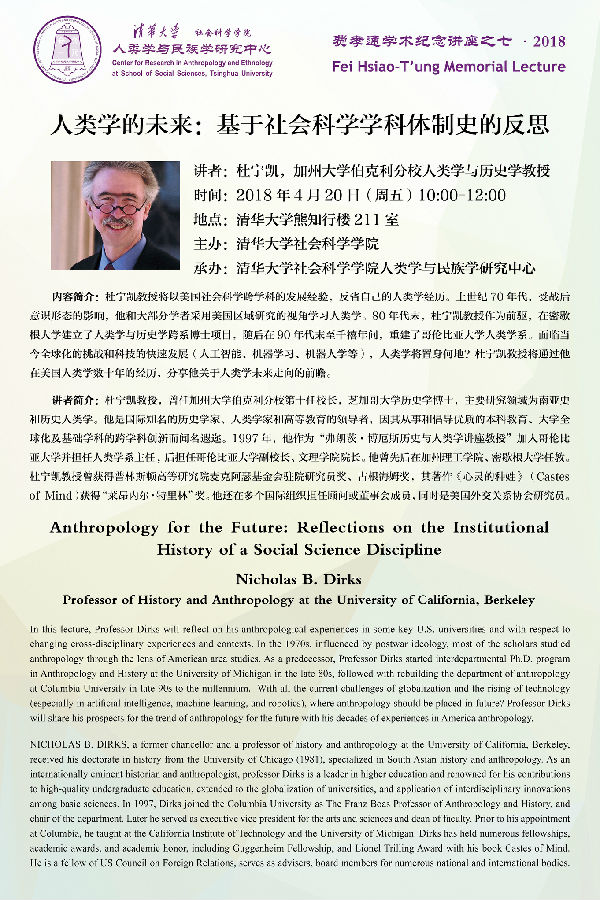人类学的未来:基于社会科学学科体制史的反思
Anthropology for the Future: Reflections on the Institutional History of a Social Science Discipline
【讲者】杜宁凯(Nicholas Dirks),加州大学伯克利分校人类学与历史学教授,曾任加州大学伯克利分校第十任校长
【时间】2018年4月20日(周五)10:00-12:00
【地点】清华大学熊知行楼211室
【内容简介】
杜宁凯教授将以美国社会科学跨学科的发展经验,回顾自己的人类学经历。上世纪70年代,受战后意识形态的影响,他和大部分学者采用美国区域研究的视角学习人类学。80年代末,杜宁凯教授作为前驱,在密歇根大学建立了人类学与历史学跨系博士项目,随后在90年代末至千禧年间,重建了哥伦比亚大学人类学系。面临当今全球化的挑战和科技的快速发展(人工智能、机器学习、机器人学等),人类学将置身何地?杜宁凯教授将通过他在美国人类学数十年的经历,分享他关于人类学未来走向的前瞻。
In this lecture, Professor Dirks will reflect on his anthropological experiences in some key U.S. universities and with respect to changing cross-disciplinary experiences and contexts. In the 1970s, influenced by postwar ideology, most of the scholars studied anthropology through the lens of American area studies. As a predecessor, Professor Dirks started interdepartmental Ph.D. program in Anthropology and History at the University of Michigan in the late 80s, followed with rebuilding the department of anthropology at Columbia University in late 90s to the millennium. With all the current challenges of globalization and the rising of technology (especially in artificial intelligence, machine learning, and robotics), where anthropology should be placed in future? Professor Dirks will share his prospects for the trend of anthropology for the future with his decades of experiences in America anthropology.
【讲者简介】
杜宁凯教授,曾任加州大学伯克利分校第十任校长,芝加哥大学历史学博士,主要研究领域为南亚史和历史人类学。他是国际知名的历史学家、人类学家和高等教育的领导者,因其从事和倡导优质的本科教育、大学全球化及基础学科的跨学科创新而闻名遐迩。1997年,他作为“弗朗茨·博厄斯历史与人类学讲座教授”加入哥伦比亚大学并担任人类学系主任,后担任哥伦比亚大学副校长、文理学院院长。他曾先后在加州理工学院、密歇根大学任教。杜宁凯教授曾获得普林斯顿高等研究院麦克阿瑟基金会驻院研究员奖、古根海姆奖,其著作《心灵的种姓》(Castes of Mind)获得“莱昂内尔·特里林”奖。他还在多个国际组织担任顾问或董事会成员,同时是美国外交关系协会研究员。
NICHOLAS B. DIRKS, a former chancellor and a professor of history and anthropology at the University of California, Berkeley, received his doctorate in history from the University of Chicago (1981), specialized in South Asian history and anthropology. As an internationally eminent historian and anthropologist, professor Dirks is a leader in higher education and renowned for his contributions to high-quality undergraduate education, extended to the globalization of universities, and application of interdisciplinary innovations among basic sciences. In 1997, Dirks joined the Columbia University as The Franz Boas Professor of Anthropology and History, and chair of the department. Later he served as executive vice president for the arts and sciences and dean of faculty. Prior to his appointment at Columbia, he taught at the California Institute of Technology and the University of Michigan. Dirks has held numerous fellowships, academic awards, and academic honor, including Guggenheim Fellowship, and Lionel Trilling Award with his book Castes of Mind. He is a fellow of US Council on Foreign Relations, serves as advisers, board members for numerous national and international bodies.

